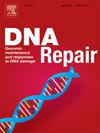The flap endonuclease-1 mediated maturation of Okazaki fragments is critical for the cellular tolerance to remdesivir
IF 2.7
3区 生物学
Q2 GENETICS & HEREDITY
引用次数: 0
Abstract
Remdesivir is a 1’-cyano-modified adenine nucleotide analog used for the treatment of COVID-19. Recently, the anti-carcinogenic effect of remdesivir has been also identified in human cancers. However, the impact of this drug and the mechanisms underlying the cellular tolerance to remdesivir have not been elucidated. Here, we explored DNA repair pathways responsible for the cellular tolerance to remdesivir by monitoring the sensitivity of 24 mutant DT40 cells deficient in various DNA repair pathways. We found that cells deficient in FEN1 displayed the highest sensitivity against remdesivir. Since FEN1 contributes to base excision repair (BER), we measured the cellular sensitivity to remdesivir in mutants deficient in BER and found that other BER mutants such as XRCC1−/− and PARP1−/− cells are tolerant to remdesivir, indicating that FEN1 contributes to cellular tolerance to remdesivir through roles other than BER. We observed augmented DNA damage and acute cell cycle arrest at early S-phase after remdesivir treatment in FEN1−/− cells. Moreover, the replication fork progression was significantly slowed by remdesivir in FEN1−/− cells, indicating a direct involvement of FEN1 in replication fork progression when replication is challenged by remdesivir. Since FEN1 contributes to Okazaki fragment maturation (OFM), a process ligating Okazaki fragments generated during lagging strand synthesis, we analyzed the kinetics of the repair of single-strand breaks (SSBs) in nascent DNA. Strikingly, FEN1−/− cells exhibited slowed kinetics in OFM, and remdesivir incorporation critically impaired this process in FEN1−/− cells. These results indicate that remdesivir is preferentially incorporated in Okazaki fragments leading to the failure of Okazaki fragment maturation and FEN1 plays a critical role in suppressing remdesivir-mediated DNA damage through Okazaki fragment processing. Collectively, we revealed a previously unappreciated role of FEN1 in the cellular tolerance to remdesivir.
瓣状内切酶-1介导的冈崎片段成熟对细胞耐受雷米替韦至关重要
雷米地韦是一种 1'-氰基修饰的腺嘌呤核苷酸类似物,用于治疗 COVID-19。最近,在人类癌症中也发现了雷米替韦的抗癌作用。然而,这种药物的影响以及细胞对雷米替韦耐受的机制尚未阐明。在这里,我们通过监测 24 个缺乏各种 DNA 修复途径的突变 DT40 细胞对雷米地韦的敏感性,探索了导致细胞对雷米地韦耐受性的 DNA 修复途径。我们发现,缺乏 FEN1 的细胞对雷米替韦的敏感性最高。由于FEN1有助于碱基切除修复(BER),我们测量了缺乏BER的突变体细胞对雷米地韦的敏感性,发现其他BER突变体,如XRCC1-/-和PARP1-/-细胞对雷米地韦有耐受性,这表明FEN1通过BER以外的作用促进细胞对雷米地韦的耐受性。我们观察到,FEN1-/-细胞在雷米替韦处理后,DNA损伤加剧,细胞周期在早期S期急剧停滞。此外,在 FEN1-/- 细胞中,雷米替韦明显减缓了复制叉的进展,这表明当复制受到雷米替韦的挑战时,FEN1 直接参与了复制叉的进展。由于 FEN1 有助于冈崎片段成熟(OFM)--一个连接滞后链合成过程中产生的冈崎片段的过程,我们分析了新生 DNA 中单链断裂(SSB)的修复动力学。令人震惊的是,FEN1-/-细胞在OFM中表现出缓慢的动力学,而雷米地韦的加入严重影响了FEN1-/-细胞的这一过程。这些结果表明,雷米地韦会优先掺入冈崎片段,导致冈崎片段成熟失败,而 FEN1 在通过冈崎片段处理抑制雷米地韦介导的 DNA 损伤方面起着关键作用。总之,我们揭示了 FEN1 在细胞耐受雷米替韦方面以前未被认识到的作用。
本文章由计算机程序翻译,如有差异,请以英文原文为准。
求助全文
约1分钟内获得全文
求助全文
来源期刊

DNA Repair
生物-毒理学
CiteScore
7.60
自引率
5.30%
发文量
91
审稿时长
59 days
期刊介绍:
DNA Repair provides a forum for the comprehensive coverage of DNA repair and cellular responses to DNA damage. The journal publishes original observations on genetic, cellular, biochemical, structural and molecular aspects of DNA repair, mutagenesis, cell cycle regulation, apoptosis and other biological responses in cells exposed to genomic insult, as well as their relationship to human disease.
DNA Repair publishes full-length research articles, brief reports on research, and reviews. The journal welcomes articles describing databases, methods and new technologies supporting research on DNA repair and responses to DNA damage. Letters to the Editor, hot topics and classics in DNA repair, historical reflections, book reviews and meeting reports also will be considered for publication.
 求助内容:
求助内容: 应助结果提醒方式:
应助结果提醒方式:


